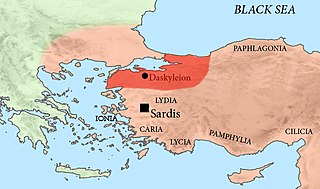Related Research Articles

Nicomedes I, second king of Bithynia, was the eldest son of Zipoetes I, whom he succeeded on the throne in 278 BC.

Nicomedes IV Philopator was the king of Bithynia from c. 94 BC to 74 BC. He was the first son and successor of Nicomedes III of Bithynia.
Ziaelas, third king of Bithynia, was a son of Nicomedes I and Ditizele.
Mithridates I Ctistes, also known as Mithridates III of Cius, was a Persian nobleman and the founder of the Kingdom of Pontus in Anatolia.
Ariobarzanes was the second king of Pontus, succeeding his father Mithridates I Ctistes in 266 BC. He died in an uncertain date between 258 and 240 BC. He obtained possession of the city of Amastris in Paphlagonia, which was surrendered to him. Ariobarzanes and his father sought the assistance of the Gauls, who had come into Asia Minor twelve years before the death of Mithridates, to expel the Egyptians sent by Ptolemy II Philadelphus. Ariobarzanes was succeeded by Mithridates II.
Zipoetes I, also Zipoites I or Ziboetes I, possibly Tiboetes I was a ruler of Bithynia.

Antiochus, called Hierax for his grasping and ambitious character, was the younger son of Antiochus II and Laodice I and separatist leader in the Hellenistic Seleucid kingdom, who ruled as king of Syria during his brother's reign.

Calas or Callas was an ancient Greek, son of Harpalus of Elimiotis and first cousin to Antigonus, king of Asia.
Ptolemy, king of Epirus was the second son of Alexander II, king of Epirus, and Olympias, grandson of the great Pyrrhus and brother of Phthia of Macedon. He was named in honour of his late uncle Ptolemy. He succeeded to the throne on the death of his elder brother, Pyrrhus II of Epirus, but reigned only a very short time, having set out on a military expedition, during the course of which he fell sick and died or, according to Polyaenus, he was treasonably assassinated. The date of his reign cannot be fixed with certainty, but as he was a contemporary of Demetrius II, king of Macedonia, it may be placed between 239 and 229 BC. He was succeeded by Deidamia II or Pyrrhus III.
Manius Aquillius was a Roman senator who served as consul in 129 BC. He put an end to the war which had been carried on against Aristonicus, the son of Eumenes II, king of Pergamon, and which had been almost terminated by his predecessor, Marcus Perperna. On his return to Rome, he was accused by Publius Lentulus of maladministration in his province, Asia, but was acquitted by bribing the judges. He obtained a triumph on account of his successes in Asia, but not until 126 BC.

Ariarathes VIII Epiphanes, King of Cappadocia, was the second son of Ariarathes VI of Cappadocia and wife Laodice of Cappadocia. Ariarathes VIII had an older sister called Nysa and an older brother called Ariarathes VII of Cappadocia.

Amyntas, Tetrarch of the Trocmi was a King of Galatia and of several adjacent countries between 36 and 25 BC, mentioned by Strabo as contemporary with himself. He was the son of Brogitarus, king of Galatia, and Adobogiona, daughter of king Deiotarus Philoromaeus.
Tium was an ancient settlement, also known as Filyos, on the south coast of the Black Sea at the mouth of the river Billaeus in present-day Turkey. Ancient writers variously assigned it to ancient Paphlagonia or Bithynia.
Alexander Philalethes was an ancient Greek physician, whom Priscian called Alexander Amator Veri, and who was probably the same person quoted by Caelius Aurelianus under the name of Alexander Laodicensis. He lived probably towards the end of the 1st century BC, as Strabo speaks of him as a contemporary. He was a pupil of Asclepiades of Bithynia, succeeded an otherwise unknown Zeuxis as head of a celebrated Herophilean school of medicine, established in Phrygia between Laodicea and Carura, and was tutor to Aristoxenus and Demosthenes Philalethes. He is several times mentioned by Galen and also by Soranus, and appears to have written some medical works, which are no longer extant. The view, once current, that Alexander's Areskonta served as a doxographical basis for such authors as Anonymus Londinensis, Aetius the doxographer, Soranus of Ephesus, and Anonymus Bruxellensis is an inference on the basis of flimsy evidence.
Zipoetes II, also Zipoites II or Ziboetes II, possibly Tiboetes II was a ruler of Bithynia from 279 BCE to 276 BCE; his name, which survives chiefly in Hellenized forms, has three syllables.
The gens Aurunculeia was a plebeian family at Rome. None of the members of this gens ever obtained the consulship; the first who obtained the praetorship was Gaius Aurunculeius, in 209 BC.
Nysa or Nyssa was a Greek Princess from the Kingdom of Bithynia.
Marcus Aurelius Cotta was a Roman politician and general who was consul in 74 BC. He was posted to Bithynia with a Roman fleet as part of the Third Mithridatic War. He was defeated by King Mithridates VI of Pontus. Rescued by his fellow consul he reduced the Pontic coast and captured the city of Heraclea after a two-year siege. Returning to Rome in 70 BC, Cotta was acclaimed for his victory. However, around 67 BC he was convicted of the misappropriation of war booty and expelled from the Senate, a signal mark of disgrace.
Boteiras was a local prince of the region of Bithynia, and the father of Bas of Bithynia, first independent ruler of Bithynia, who governed fifty years, from 376 to 326 BCE.
References
Notes
Sources
- Smith, William (editor); Dictionary of Greek and Roman Biography and Mythology , "Bas", Boston, (1867)
 This article incorporates text from a publication now in the public domain : Smith, William, ed. (1870). "Bas". Dictionary of Greek and Roman Biography and Mythology . Vol. 1. p. 465.
This article incorporates text from a publication now in the public domain : Smith, William, ed. (1870). "Bas". Dictionary of Greek and Roman Biography and Mythology . Vol. 1. p. 465.